
From Ukraine peace plans to Kazakh uranium—all that and more in our new nuclear digest
Our November Nuclear Digest by Bellona’s Environmental Transparency Center is out now. Here’s a quick taste of just three nuclear issues arising in U...
News

Publish date: February 28, 2014
News
Prison officials in Krasnodar have finally told the lawyer of Yevgeny Vitishko, an environmentalist who criticized the impact of the Sochi Olympics, that he has been sent to a prison colony in the Tambov region after disappearing from Krasnodar’s remand jail six days ago, but did not specify which one.
Vitishko has been sentenced to three years in so-called “settlement” penal colony, which does not imply hard labor. He is accused of spray-painting a construction fence in 2011, which was built in protected Black Sea forests, and surrounds the now no-longer secret mansion of Krasnodar Regional Governor Alexander Tkachev. The slogans written on the fence were “This is our forest” and “Tkachev is a Thief.”
Vitishko, Bellona, his fellow activsts, witnesses and other of his supports say he never defaced the fence. Bellona further says that a three-year penal colony sentence is grossly out of proportion to the supposed crime. Ironically, the fence, according to Krasnodar forestry officials and even prosecutors in the case against Vitishko, does not officially exist.
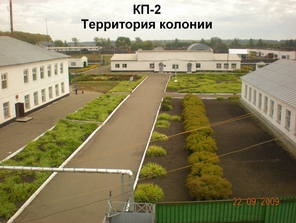
Marina Dubrovina, Vitishko’s laywer in Krasnodar said last evening she had finally received an answer to her official inquiry regarding her client’s whereabouts yesterday from Valery Gunichev, warden of Krasnodar’s remand prison No 1.
Gunichev’s letter (in Russian) indicated Vitishko had been sent to an unspecified prison colony in the Tambov Region, some 1000 kilometers north of the Krasnodar Region. He is most likely being transported there by train.
Gunichev’s letter to Dubrovina, posted by Vitishko’s group, the Environmental Watch on the North Caucasus (EWNC’s) on its facebook site, states that Vitishko “has been sent to the penal service of the Tambov region to serve the rest of his punishment.”
EWNC has promised Russia-wide pickets calling for Vitishko’s freedom. Earlier today, solo demonstrators unfurled banners on Moscow’s central Pushkin Square.
The protests, said the group by email will kick off a week of national and international public gatherings in Vitishko’s support.
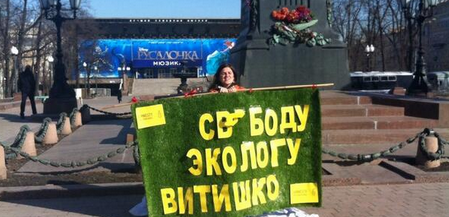
Vitishko has been declared a Prisoner of Conscience by Amnesty International.
Hopes high that Vitishko sent to Sadovy Prison Colony
Vitishko’s colleague and friend Suren Gazaryan, said from Tallinn, Estonia that Vitishko will likely be sent to the KP-2 or so-called Sadovy Penal colony some 90 kilometers east of the city of Tambov, as it is the only settlement – as opposed to hard labor – penal colony in the area.
Gazaryan, who received political asylum in Estonia last year as bogus charges against him for his high-profile criticism of the Olympics piled up, was quick to point out that Vitishko has at no time since he was jailed in Tuapse on February 3, on charges of swearing in public been allowed to return home.
Vitishko has not even received a change of clothes, his other personal affects or money – which he will need to buy clothes at the prison colony – prior to being shipped off to the Tambov Region.
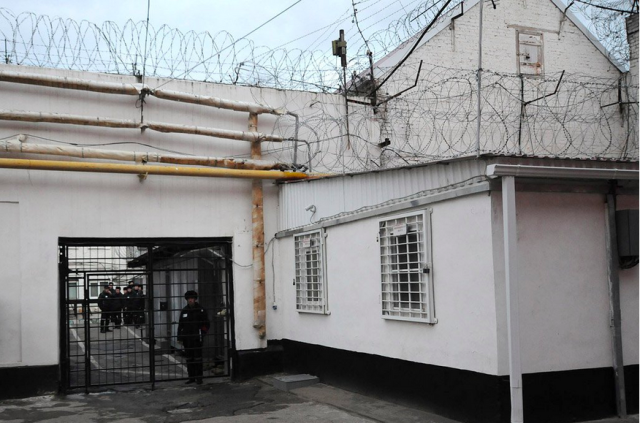
Though EWNC members are optimistic that Vitishko will be sent to the Sadovy Penal colony, there are no guarantees and his final stopping point may not be known for several weeks, Anna Mitrenko of the Public Monitoring Committee, a prisoners’ rights group affiliated with the Presidential Council for Human Rights, told Bellona.
So many mishaps so far that Sadovy is no guarantee
Indeed, when telephoned by Bellona today and asked if Vitishko was expect at the Sadovy colony anytime soon, warden Vladimir Koroktevich said: “I have no information to that effect.” However, he did add that he was “technically not allowed to communicate such information to the media, even if I did have it.”
According to Mitrenko, there is only one other prison colony in the Tambov Region, which falls under the hard labor category. Because Vitishko was sentenced to a settlement colony, Mitrenko said the Sadovy facility is where he should end up.
“But given the number of times jail and prison officials and the court have altered the conditions of his incarceration, there aren’t any guarantees,” she told Bellona, adding that sending him anywhere other than Sadovy would be “a gross violation of his sentence.”
It was hardly encouraging to Dubronvina when she finally met with Vitishko in the Krasnodar jail to find he was being held in a special cell block for “especially dangerous criminals,” instead of among the jail’s general population.
This particular section of the jail is guarded by Russia’s “Spetsnaz” or highly-trained and heavily armed special forces soldiers as opposed to standard prison guards.
Where Vitishko comes to a stop, said Mitrenko, may not be known until late next month.
“Prison transfers take a long time, so it could easily be one week, two weeks, three weeks before we find out were he finally ends up,” she said.
Mitrenko is in touch with her colleagues in the Tambov Region branch of the Public Monitoring Committee, to bring pressure to bear on local penal authorities.
“We are doing what we can to make sure Vitishko is transported to the Sadovy Colony,” she said.
Stalin-era farm prison camp
According to information posted by EWNC, the Sadovy Colony seems a rather bucolic setting that defies the usual images conjured by Russia’s sinister GULag system. The colony was originally a communal farm that was in 1938 turned by the Stalin regime into a prison camp.
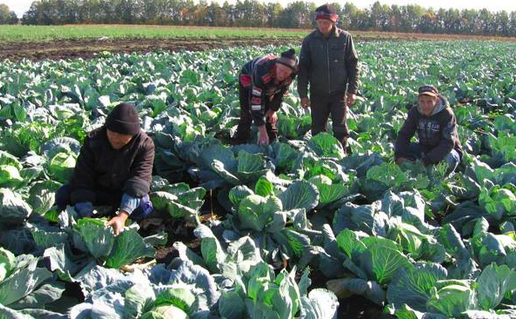
Vitishko would, according to EWNC’s information, be one of about 800 prisoners who would work at farming.
According to the website, the colony was created under Stalin in 1938 and replaced a communal farm. It has a capacity of 800 people who work at the farm.
Cold and ill
Vitishko’s arrest in early February coincided with the beginning of the balmy weather that plagued the Sochi Olympics, with temperatures reaching as high as 12-15 degrees in his hometown of Tuapse, the Sochi waterfront skating venues, and raising temperatures to around 6 at the mountain ski venues
Vitishko therefore has no clothes with him that are suitable to the weather in the Tambov Region, where high temperature for the forseeable future, according to Accuweather.com, are expected to be 2-4 degrees below zero.
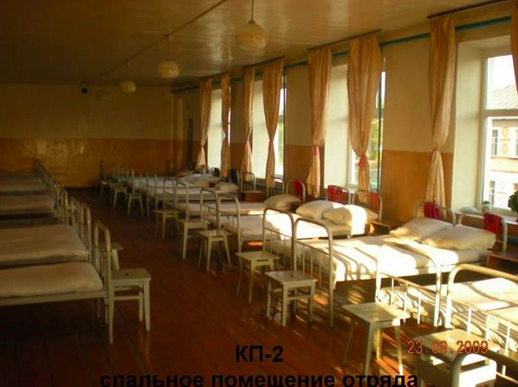
Mitrenko said her group was trying to get warm clothes to Vitishko in transit, and said he should have been issued something more than the light raingear he was arrested in. But attempts to get him winter jackets and gloves have largely been thwarted by prison transfer officials, she said.
Vitishko was also very ill with a cough last week when visited by Mitrenko and Dubrovina and had been denied medical care. Mitrenko said that Krasnodar remand prison officials did finally allow him to see a doctor, and that he was given medication before being secretly bundled off to the Tambov Region.
Vitishko’s second disappearance came as Olympic torch extinguished
Vitishko’s second disappearance since he his appeal against a three-year penal colony sentence in the Krasnodar court was overturned became known when the EWNC’s Anna Mikhailova tried to deliver a parcel to Vitishko on Monday, the day after the Olympic’s closing ceremonies.
Mikhailova was curtly told Vitishko was no longer being held at the jail.
During the course of the Sochi Games, Vitishko has his appeal against a three-year penal colony sentence for what had come to be known as the “fence incident” overturned by Krasnodar court judge Andrei Konov.
Vitishko was also jailed between February 3 and 18 on trumped up charges of public swearing and held in his hometown jail of Tuapse, to keep him away from Western media as well as from attending his appellate hearing in Krasnodar.
Though he was supposed to be freed on the February 18 to say goodbye to his family before turning himself over to penal colony officials, he was instead secretly sent to the Krasnodar jail via an illegal order signed by judge Konov who overturned his Krasnodar appeal.
Under that new order – which Vitishko’s Sochi-based lawyer Alexander Popkov told Bellona last week was illegal because it was issued in his absence – Konov stipulated that Vitishko should be transferred to the as-yet-unknown prison colony under armed guard, instead of his initial ruling that would have allowed Vitishko time to say goodbye to his wife and two sons and collect his belongings.
The International Olympic Committee had said that they have been “assured” by the Russian authorities that Vitishko’s case is not related to the Olympic Games – a famous refrain issued by the IOC as it stood by and declared that sweeps against activists, environmental devastation, and the public horsewhipping of members of the punk collective Pussy Riot who tried to stage a flash protest in Sochi were “not Games-related.
However Vitishko, Human Rights Watch, Amnesty International, Bellona have said the EWNC is a victim of a crackdown on critics of the President Vladimir Putin’s showcase Sochi Games, and that he is being punished for speaking out about environmental destruction in the sensitive Black Sea region.

Our November Nuclear Digest by Bellona’s Environmental Transparency Center is out now. Here’s a quick taste of just three nuclear issues arising in U...

For three years now, Bellona has continued its work in exile from Vilnius, sustaining and expanding its analysis despite war, repression, and the collapse of international cooperation with Russia in the environmental and nuclear fields

The Board of the Bellona Foundation has appointed former Minister of Climate and the Environment Sveinung Rotevatn as Managing Director of Bellona No...

Økokrim, Norway’s authority for investigating and prosecuting economic and environmental crime, has imposed a record fine on Equinor following a comp...